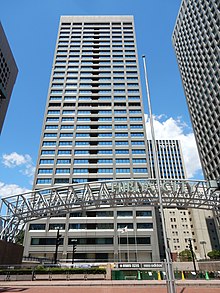JFE Steel

JFE Steel (Japanese: JFEスチール) is the second largest Japanese steel manufacturer. The company was created in 2002 through the merger of the steel manufacturing business of Kawasaki Steel and (Nihon Kokan). It is owned by JFE Holdings, which is listed on the Tokyo Stock Exchange.
Recent Mergers and Spinoffs[]
- For the history of JFE Steel, refer to JFEスチールの沿革 (History of JFE Steel)
JFE Steel was created in 2002 as Kawasaki Steel absorbed the steel making business of Nihon Kokan (NKK). At the same time, NKK's engineering business absorbed Kawasaki Steel's engineering business to form (JFEエンジニアリング).
In the same year of 2002, NKK's shipbuilding business was spun off as a separate entity, which in the same year merged with Hitachi Shipbuilding to form Universal Shipbuilding, that then in 2013 was merged with IHI's shipbuilding business to become Japan Marine United Corporation.
After these mergers and spinoffs, JFE Steel is the second largest steel company in Japan, after Nippon Steel & Sumitomo Metal. Overseas, it owns 50% of California Steel Industries, U.S.A. It is in a limited partnership with AK Steel, formerly called Armco. In Korea, it came to own 15% Dongkuk Steel. In China, it has a joint hot rolling & electrogalvanization mill with Guangzhou Iron & Steel Enterprise Group (广州钢铁企业集团). In Thailand, it produces electrogalvanization steel sheets at 80%-owned Thai Cold Rolled Steel Sheet Public Co., Ltd.
Brief History of Kawasaki Steel[]
- For the history of Kawasaki Steel, refer to 川崎製鉄の沿革 (History of Kawasaki Steel)
Kawasaki Heavy Industries (KHI) started its business as a shipbuilding company in 1878 in Kawasaki, Kanagawa, and started to make steel for its own purpose in 1906. In the post-World War II recovery of 1950, KHI span off its steel-making business as Kawasaki Steel.
Kawasaki Steel opened Chiba Iron Works in 1951, followed by Mizushima Iron Works, now called Kurashiki Iron Works, in 1961. In 1989, it entered into a limited partnership with Armco, U.S.A.. The company was renamed AK Steel Holding in 1993 when it became publicly traded.[1] Kawasaki Steel together with Brazil's Vale do Rio Doce (now Vale) re-established California Steel Industries in 1986.
It made cooperative agreement with Korea's Dongkuk Steel in 1991 and another agreement with Hyundai Hysco in 2000.
Brief History of NKK[]
- For the history of NKK, refer to NKKの沿革 (History of NKK)
Nihon Kokan Co., Ltd. (NKK), was established in 1912 with a steel pipes plant in Kawasaki, Kanagawa, on Tokyo Bay, in 1912 by Asano zaibatsu. After the Second World War, the plant was re-established there in 1946. In 1968, the steel making facilities of Kawasaki, Tsurumi and Mizue were integrated into Keihin Iron Works.
NKK opened Fukuyama Iron Works in Fukuyama, Hiroshima, in 1965. In 1976, it expanded its Keihin Iron Works to Ogishishima, a newly reclaimed island in Tokyo Bay, with a blast furnace, immediately followed by a converter, a billet/bloom/slab rolling mill and a plate rolling mill. In 1979, a second blast furnace and a hot rolling mill were added.
NKK acquired 50% of National Steel in 1990, but sold this American company to U.S. Steel in 2002.
Major plant locations[]
The steel production sites of JFE Steel, a JFE Holding subsidiary, are organized into two regions, East Japan and West Japan.
East production sites[]
There are two major steel works in the East Japan Production Sites (JFEスチール東日本製鉄所):
Keihin Steel Works[]
After the Second World War, the plant was re-established there in 1946. Its Tsurumi site, Mizue site and the first blast furnace in Mizue were established, respectively, in 1947, 1959 and 1962. In 1968, all these three sites were integrated into Keihin Works (京浜製鉄所). New works in Ogishima (扇島), a newly reclaimed land nearby, started operation in 1976, and the second blast furnace was constructed there in 1978. Currently only one out of two blast furnace are in operation.[2]

Chiba Steel Works[]
Kawasaki Heavy Industries incorporated Kawasaki Steel in 1965. Kawasaki Steel constructed Japan's most modern steel works in 1951, in Chiba, Chiba (千葉製鉄所), on Tokyo Bay.[3] The first, second, fifth and sixth furnaces were completed, respectively, in 1953, 1958, 1965, and 1977. The first four furnaces are already demolished.
West production sites[]
There are two major steel works in the West Japan production sites (JFEスチール西日本製鉄所):
Kurashiki Steel Works[]
Kurashiki Steel Works (倉敷製鉄所), which used to be known as Mizushima Steel Works, was established by Kawasaki Steel in 1961, in Mizushima, Kurashiki, Okayama on the Inland Sea, adjacent to Mitsubishi Motors's Mizushima Plant. As of February, 2010, three out of four blast furnaces are in operation.

Fukuyama Steel Works[]
Fukuyama Steel Works(福山製鉄所) in Fukuyama, Hiroshima, on the Inland Sea, opened in 1965 by Nippon Kokan. As of May 2011, three blast furnaces out of the existing four (Nos. 3, 4 and 5) are in operation.
See also[]
- Nippon Steel
- Japan's Steel Works
References[]
External links[]
- Official site
- History of JFE Steel since 1943.
- Manufacturing companies based in Tokyo
- Steel companies of Japan
- Manufacturing companies established in 2002
- Japanese companies established in 2002
- Fuyo Group
- Japanese brands